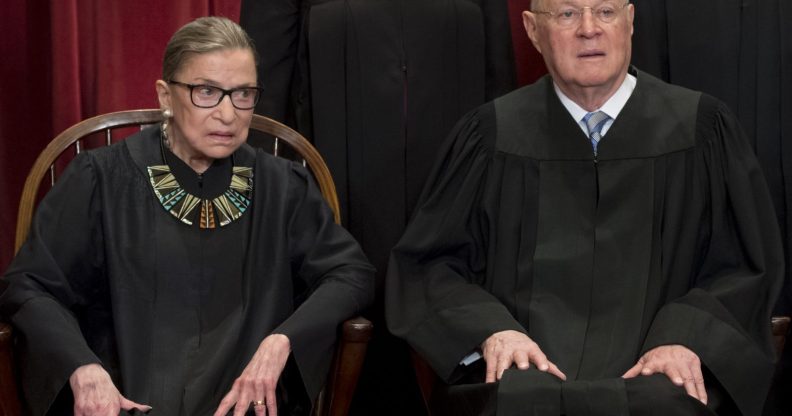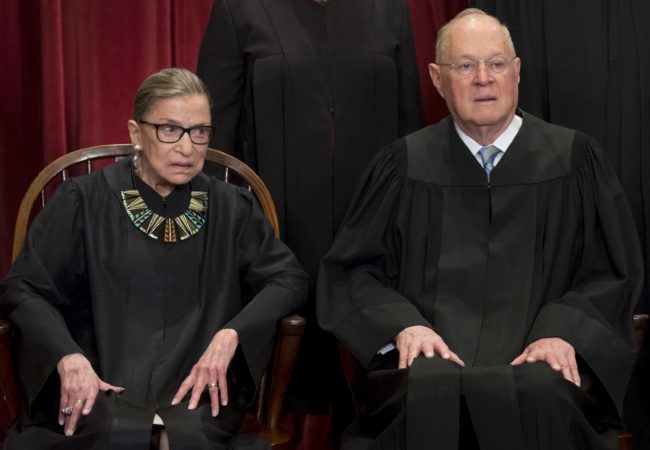Anthony Kennedy is retiring from the Supreme Court: What it means for LGBT rights

US Supreme Court Associate Justice Anthony M. Kennedy (R) and Associate Justice Ruth Bader Ginsburg (L) sit for an official photo with other members of the US Supreme Court in the Supreme Court in Washington, DC, June 1, 2017. / AFP PHOTO / SAUL LOEB (Photo credit should read SAUL LOEB/AFP/Getty Images)
The Supreme Court’s leading champion of gay rights Justice Anthony Kennedy has retired, and will likely be replaced by a less LGBT-friendly candidate.
81-year-old Kennedy, who was the longest serving member of the Court, announced on Wednesday that he would step down from his position, which will give President Donald Trump the opportunity to change the direction of the Supreme Court.
Kennedy, who was a Republican appointee, has been the swing vote on many key votes including being responsible for legalising same-sex marriage in the US.

US President Donald Trump (L) listens while Supreme Court Justice Anthony Kennedy speaks during a ceremony in the Rose Garden of the White House. (BRENDAN SMIALOWSKI/AFP/Getty Images)
Without Kennedy the court will be split between four liberal justices, appointed by Democratic presidents and four conservatives, named by Republicans.
Trump’s choice of successor is likely to give conservatives a solid majority, and will come from an updated list 25 of nominees that he put out during his campaign.
According to the Associated Press, the prominent names on the list are Judges Thomas Hardiman of Pennsylvania and William Pryor of Alabama and Judge Brett Kavanaugh, who serves on the federal appeals court in Washington.

US Supreme Court Associate Justice Anthony M. Kennedy (R) and Associate Justice Ruth Bader Ginsburg (L) sit for an official photo with other members of the US Supreme Court in the Supreme Court in Washington, DC. (SAUL LOEB/AFP/Getty Images)
They found that Judge Hardiman previously wrote an opinion for a three-judge panel, saying a gay man could not say he was discriminated against because of religion because his employer fired him because the employer’s religious beliefs were that “a man should not lay with another man.” However, the Hardiman panel ruled that the gay employee’s claim that he was discriminated against “because of sex” should have been submitted to a jury.
South Florida Gay News found that Judge Pryor joined a three-judge panel decision in 2016 that said the court had no authority to review a Haitian transgender man’s petition to stay in this country because he had been convicted of crimes and had failed to establish a likelihood of future persecution.
But in 2011, Pryor joined two other judges to affirm a district court ruling in favor of a transgender employee. The employee claimed her employer fired her based on sex and because of her gender identity disorder. The district court ruled for her on the basis of sex discrimination.

President Donald Trump (Spencer Platt/Getty)
Before Kennedy’s retirement announcement Senator Chris Coons vowed to use pride month to share all of Trump’s anti-LGBT candidates for judicial posts nationwide.
On Wednesday he posted about potential candidate Ryan Bounds, nominated to be a judge on the Ninth Circuit Court of Appeals, who claimed that “#LGBT Americans liked to ‘fancy [themselves] oppressed’ and therefore see discrimination where it does not exist.”
For the remainder of #PrideMonth, I will be sharing the names of President Trump’s anti-LGBT judicial nominees. Too many of our President’s nominees have distinguished themselves for their statements disparaging the #LGBT community and supporting discrimination. #CourtsMatter
— Senator Chris Coons (@ChrisCoons) June 25, 2018
During his 30-year-reign Kennedy was involved in the Court’s first major pro-gay rights decision.
In 1996’s Romer v. Evans, he invoked the 14th Amendment’s Equal Protection Clause in striking down a Colorado state constitutional amendment that prevented cities and towns from adopting their own bans on discrimination against gays, lesbians, or bisexuals.
The other two older justices, Ruth Bader Ginsburg, 85, and Stephen Breyer, 79, are Democratic appointees who would not appear to be going anywhere during a Trump administration if they can help it, according to the Associated Press.

